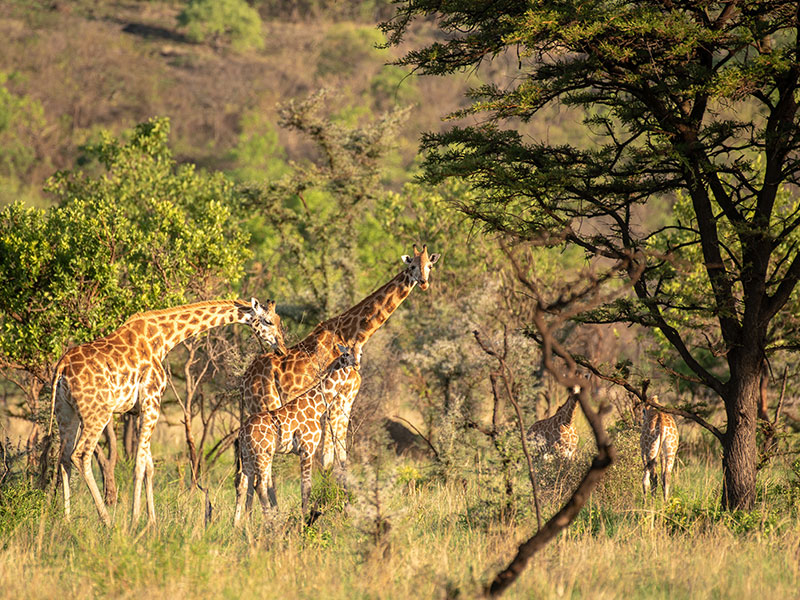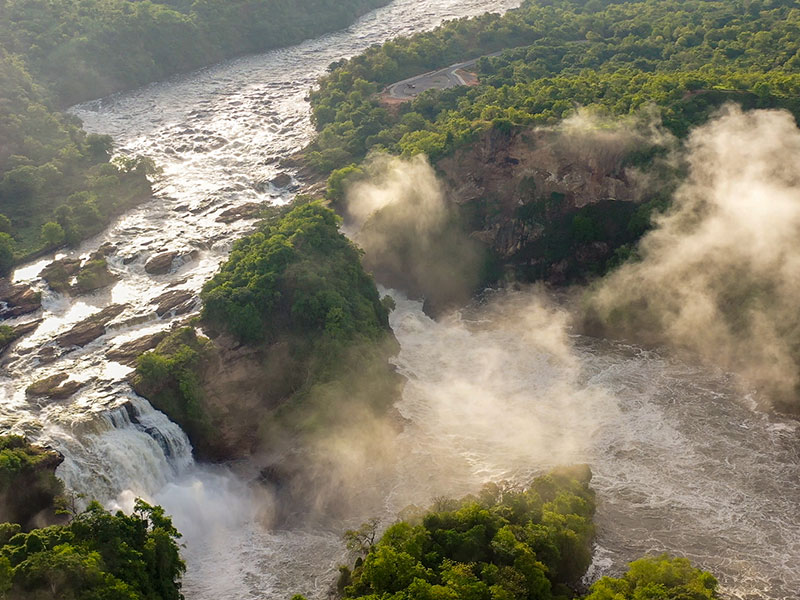Comparing Uganda Rwanda Safari. When planning a primate or wildlife safari in East Africa, two countries consistently rise to the top of every traveler’s list: Uganda and Rwanda. Both destinations offer unforgettable encounters with endangered mountain gorillas, breathtaking landscapes, and unique cultural experiences. However, there are differences in accessibility, pricing, wildlife diversity, and overall travel experiences that can influence which destination is best suited for your safari adventure.
This guide provides a comprehensive comparison of Uganda and Rwanda safaris, exploring their strengths, challenges, and what makes each country unique.
Gorilla Trekking in Uganda vs. Rwanda
Uganda
Uganda is home to over half of the world’s mountain gorilla population, primarily found in Bwindi Impenetrable National Park and Mgahinga Gorilla National Park. Gorilla trekking here is an adventurous experience, involving hikes through dense rainforests, steep hills, and rugged terrain. The treks can take between 2 to 7 hours depending on the gorilla family’s location.
- Permit Costs: Uganda’s gorilla trekking permits cost $800 per person (as of 2025). This makes Uganda more budget-friendly compared to Rwanda.
- Experience: The treks are longer and more challenging but provide a greater sense of adventure and raw wilderness.
- Diversity: Bwindi offers four trekking sectors (Buhoma, Ruhija, Rushaga, and Nkuringo), each with unique terrain and multiple gorilla families.
Rwanda
Rwanda’s gorilla trekking is done in Volcanoes National Park, part of the Virunga Mountains. The treks are generally shorter and less physically demanding compared to Uganda, making Rwanda a good option for travelers with limited time or lower fitness levels.
- Permit Costs: Rwanda charges $1500 per person for a gorilla permit, nearly double Uganda’s rate.
- Experience: The treks are well-organized and efficient, with gorilla families typically located within 2–4 hours of hiking.
- Accessibility: Volcanoes National Park is only a 2.5-hour drive from Kigali, allowing even one-day gorilla treks.
Verdict: Uganda offers a more adventurous and affordable trekking experience, while Rwanda provides comfort, accessibility, and a luxury-oriented experience.
Chimpanzee Tracking
Uganda
Uganda is often called the Primate Capital of the World, and chimpanzee tracking here is exceptional. Kibale Forest National Park is the best place, home to over 1500 chimpanzees and offering almost guaranteed sightings. Other chimpanzee tracking sites include Budongo Forest (near Murchison Falls) and Kyambura Gorge in Queen Elizabeth National Park.
Uganda also offers a chimpanzee habituation experience, allowing visitors to spend up to 4 hours with chimps, observing their natural behavior in detail.
Rwanda
Rwanda’s main chimpanzee destination is Nyungwe Forest National Park, a vast montane rainforest with about 500 chimpanzees. While sightings are possible, they are less predictable compared to Kibale. However, the forest is spectacular and also home to rare primates like colobus monkeys.
Verdict: Uganda offers a higher chance of chimpanzee encounters and more diverse locations, while Rwanda provides a scenic and unique experience in Nyungwe.
Wildlife Safaris Beyond Primates
Uganda
Uganda is not only about primates; it is a Big Five safari destination with savannah parks that rival Kenya and Tanzania.
- Murchison Falls National Park: Famous for its powerful waterfall and Nile boat cruises, offering sightings of elephants, lions, giraffes, hippos, and crocodiles.
- Queen Elizabeth National Park: Known for tree-climbing lions, boat cruises on the Kazinga Channel, and diverse birdlife.
- Kidepo Valley National Park: Remote and rugged, offering cheetahs, ostriches, and untouched wilderness.
Rwanda
Rwanda’s primary savannah safari destination is Akagera National Park, a scenic park restored from near extinction. It now has lions, elephants, giraffes, and rhinos, making it a Big Five destination as well. However, Akagera is smaller compared to Uganda’s major parks, and wildlife density is lower.
Verdict: Uganda offers more diverse and expansive safari experiences, while Rwanda’s Akagera is ideal for those combining gorillas with a shorter wildlife extension.
Accessibility and Travel Logistics
Uganda
Uganda’s gorilla parks (Bwindi and Mgahinga) are located in the southwest, about 8–9 hours’ drive from Kampala or Entebbe. Many itineraries combine gorilla trekking with chimpanzee tracking and savannah safaris, requiring longer travel times. Domestic flights are available to reduce driving hours, but they add cost.
Rwanda
Rwanda has the advantage of accessibility. From Kigali International Airport, travelers can reach Volcanoes National Park in just 2.5 hours. Akagera is about 3 hours away, while Nyungwe takes 6–7 hours by road. The country’s smaller size makes logistics simpler and more time-efficient.
Verdict: Rwanda is better for short trips or travelers with limited time. Uganda is ideal for longer, more varied safaris.
Cost Comparison
- Gorilla Permits: Uganda ($800) vs Rwanda ($1500).
- Chimpanzee Permits: Uganda ($200 in Kibale) vs Rwanda (about $100 in Nyungwe).
- Accommodation: Both countries offer budget to luxury options, but Rwanda is generally more expensive, catering to luxury travelers.
- Transport: Uganda requires longer journeys, adding to vehicle and fuel costs, but overall still more affordable than Rwanda.
Verdict: Uganda offers a more budget-friendly safari, while Rwanda positions itself as a high-end destination.
Scenery and Landscape
Uganda
Uganda is incredibly diverse, from the snow-capped Rwenzori Mountains to the savannahs of Kidepo and the lush rainforests of Bwindi. Lakes, rivers, and waterfalls make it one of the most scenic countries in Africa.
Rwanda
Rwanda is called the “Land of a Thousand Hills” for good reason. Its rolling green hills, volcanic peaks, and well-preserved national parks provide stunning views. The country is compact but consistently beautiful.
Verdict: Uganda offers greater variety in landscapes, while Rwanda is more uniformly scenic and easy to explore.
Safety and Travel Experience
Both Uganda and Rwanda are safe and welcoming destinations for tourists. Rwanda is particularly known for its cleanliness, efficiency, and excellent infrastructure. Uganda offers a more adventurous feel, with raw and authentic experiences that appeal to travelers seeking diversity and exploration.
Cultural Encounters
- Uganda: Rich cultural diversity with over 50 tribes. Cultural experiences include the Batwa trail near Bwindi, traditional dances, and community visits.
- Rwanda: A strong emphasis on unity and heritage, with opportunities to visit cultural villages near Volcanoes National Park or learn about the country’s history at the Kigali Genocide Memorial.
Verdict: Uganda offers broader cultural variety, while Rwanda offers deeply moving and curated cultural experiences.
Which Destination Should You Choose?
Choose Rwanda if: You prefer a luxury, time-efficient safari with shorter treks, excellent infrastructure, and easy access to gorillas and other attractions.
Choose Uganda if: You want a budget-friendly safari with gorillas, chimpanzees, Big Five savannah parks, cultural diversity, and adventure across varied landscapes.











